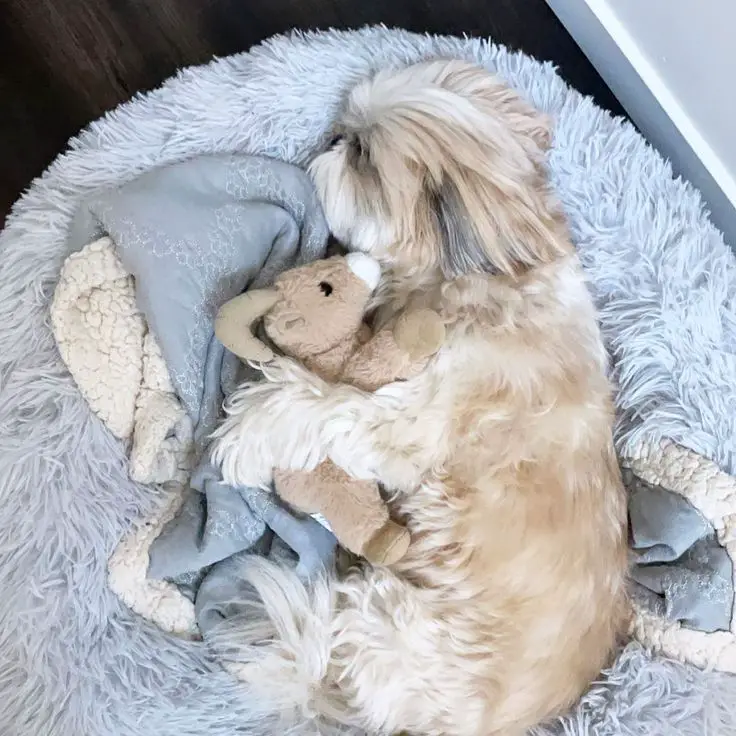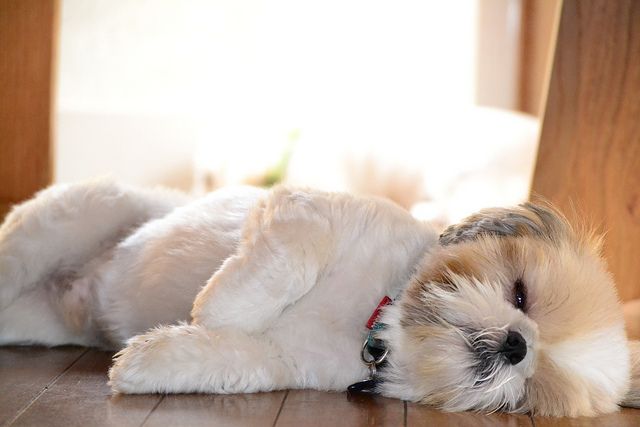
As a Shih Tzu owner, it’s essential to understand your dog’s sleep patterns and needs to ensure they lead a healthy and happy life. Shih Tzus, like all dogs, have unique sleeping habits that can differ significantly from humans. Recognizing these patterns and providing the right environment can help your furry friend get the restful sleep they need.
Typical Shih Tzu Sleep Patterns

Shih Tzus typically sleep between 12 to 14 hours a day, with puppies and older dogs often needing more rest. Unlike humans, who generally sleep in one long stretch, dogs sleep in multiple short periods throughout the day and night. This polyphasic sleep pattern is normal and helps them stay alert and ready for action when awake.
Shih Tzus may take several naps during the day, especially after periods of play or exercise. It’s common for them to sleep deeply for short periods, then wake up briefly to check their surroundings before drifting back to sleep. Understanding this pattern can help you avoid disturbing your dog’s rest unnecessarily.
The Importance of Quality Sleep

Quality sleep is crucial for a Shih Tzu’s overall health and well-being. During sleep, their bodies undergo important processes such as cell repair, growth, and immune system strengthening. Adequate rest also helps regulate their mood and behavior, making them more pleasant and easier to train.
Lack of sleep or poor-quality sleep can lead to various health issues, including weakened immune function, increased stress levels, and behavioral problems. Ensuring your Shih Tzu gets enough restful sleep is essential for their physical and mental health.
Creating a Comfortable Sleeping Environment

A comfortable sleeping environment is key to helping your Shih Tzu get the rest they need. Provide a cozy, quiet space where they feel safe and secure. A well-cushioned bed that supports their body and joints is important, especially for older dogs who may suffer from arthritis or other joint issues.
Keep the sleeping area clean and free from drafts, and consider placing the bed in a location away from high-traffic areas of your home. Consistency is important, so try to maintain a regular sleep routine and avoid sudden changes that could disrupt your dog’s sleep patterns.
Recognizing Sleep Problems

It’s important to recognize signs of sleep problems in your Shih Tzu. If your dog seems unusually restless, has difficulty falling asleep, or wakes up frequently during the night, it may indicate an underlying issue. Other signs include excessive daytime sleepiness, irritability, or changes in appetite and behavior.
Common causes of sleep problems in Shih Tzus include anxiety, pain, and medical conditions such as sleep apnea or allergies. If you suspect your dog is experiencing sleep issues, consult your veterinarian for a thorough evaluation and appropriate treatment.
Managing Anxiety and Stress

Anxiety and stress can significantly impact your Shih Tzu’s sleep quality. Common stressors include changes in routine, loud noises, and separation anxiety. Creating a calm and predictable environment can help reduce anxiety and promote better sleep.
Consider using calming aids such as pheromone diffusers, anxiety wraps, or calming supplements. Providing plenty of physical and mental stimulation during the day can also help your Shih Tzu feel more relaxed and ready for sleep at night.
The Role of Exercise

Regular exercise is essential for promoting healthy sleep patterns in Shih Tzus. Daily walks, playtime, and interactive toys can help expend energy and prevent restlessness. Exercise also provides mental stimulation, which is important for overall well-being.
However, it’s important not to overdo it, especially with young puppies or older dogs. Moderate exercise tailored to your dog’s age, health, and fitness level can help them sleep better without causing undue strain or injury.
The Impact of Diet

Diet plays a significant role in your Shih Tzu’s sleep quality. Providing a balanced diet with the right nutrients can help support overall health and promote better sleep. Avoid feeding your dog large meals right before bedtime, as this can cause discomfort and disrupt sleep.
Consider feeding smaller, more frequent meals throughout the day to maintain steady energy levels. Ensure your Shih Tzu has access to fresh water at all times, but try to limit water intake in the hours leading up to bedtime to prevent frequent nighttime trips to the bathroom.
Establishing a Sleep Routine

Establishing a consistent sleep routine can help regulate your Shih Tzu’s sleep patterns. Try to maintain regular wake-up and bedtime hours, even on weekends. Consistency helps your dog understand when it’s time to sleep and can improve overall sleep quality.
Incorporate calming activities into your dog’s bedtime routine, such as gentle petting, a short walk, or a quiet time in a dimly lit room. Avoid stimulating activities or loud noises in the hour leading up to bedtime to help your dog wind down and prepare for sleep.
Understanding the Sleep Cycle

Understanding your Shih Tzu’s sleep cycle can help you provide better care and support. Dogs experience two main types of sleep: rapid eye movement (REM) sleep and non-REM sleep. REM sleep is the stage where dreaming occurs and is essential for cognitive function and memory consolidation.
Non-REM sleep includes deep sleep stages that are important for physical restoration and growth. Both types of sleep are crucial for overall health, so it’s important to ensure your Shih Tzu gets uninterrupted rest to complete their sleep cycles.
Monitoring Sleep Patterns

Regularly monitoring your Shih Tzu’s sleep patterns can help you identify any changes or issues early. Keep track of how much your dog sleeps, their napping habits, and any signs of restlessness or discomfort. Changes in sleep patterns can be an early indicator of health problems or stress.
If you notice any significant changes or persistent sleep issues, consult your veterinarian for advice. Keeping a sleep diary can be helpful when discussing your concerns with your vet, as it provides a detailed record of your dog’s sleep habits and any abnormalities.
Dealing with Nighttime Disruptions

Nighttime disruptions can affect your Shih Tzu’s sleep quality and overall health. Common disruptions include loud noises, changes in the household, and other pets or family members moving around. Providing a quiet, dark, and comfortable sleeping area can help minimize these disruptions.
If your Shih Tzu is prone to waking up during the night, try to identify and address the cause. For example, if your dog needs to go outside to relieve themselves, establish a consistent nighttime routine that includes a final bathroom break before bed. This can help reduce nighttime awakenings and promote better sleep.
Sleep and Aging

As Shih Tzus age, their sleep patterns and needs may change. Older dogs often require more rest and may have different sleep-wake cycles compared to younger dogs. They may also experience more frequent nighttime awakenings due to health issues such as arthritis or incontinence.
Adjusting your dog’s sleeping environment to accommodate their changing needs can help improve their sleep quality. Provide orthopedic beds for joint support, keep the sleeping area warm and comfortable, and ensure easy access to water and bathroom breaks. Regular vet check-ups can help manage any age-related health issues that may affect sleep.
Recognizing Sleep Disorders

Recognizing and addressing sleep disorders in Shih Tzus is important for their overall health. Common sleep disorders include sleep apnea, narcolepsy, and restless leg syndrome. These conditions can significantly impact your dog’s quality of life and require veterinary attention.
Symptoms of sleep disorders may include loud snoring, frequent awakenings, excessive daytime sleepiness, and unusual movements during sleep. If you suspect your Shih Tzu has a sleep disorder, consult your veterinarian for a thorough evaluation and appropriate treatment. Managing sleep disorders can improve your dog’s sleep quality and overall well-being.
The Benefits of a Sleep-Friendly Diet

A sleep-friendly diet can support healthy sleep patterns in Shih Tzus. Certain nutrients, such as tryptophan, melatonin, and magnesium, can promote relaxation and improve sleep quality. Consider incorporating foods rich in these nutrients into your dog’s diet or consult your veterinarian about appropriate supplements.
Avoid feeding your dog large meals or treats right before bedtime, as this can cause discomfort and disrupt sleep. Instead, provide a balanced diet throughout the day to maintain steady energy levels and promote restful sleep. Ensuring your Shih Tzu has a healthy diet can support their overall health and well-being.
Conclusion
Understanding and supporting your Shih Tzu’s sleep patterns and needs is crucial for their health and happiness. By providing a comfortable sleeping environment, establishing a consistent sleep routine, and addressing any potential sleep issues, you can help your furry friend get the rest they need. Regular monitoring, a balanced diet, and appropriate exercise are key components of promoting healthy sleep patterns.
Early detection and treatment of sleep problems can significantly improve your Shih Tzu’s quality of life. Consult your veterinarian if you have any concerns about your dog’s sleep habits or health. With proper care and attention, you can ensure your Shih Tzu enjoys restful sleep and maintains overall well-being.


